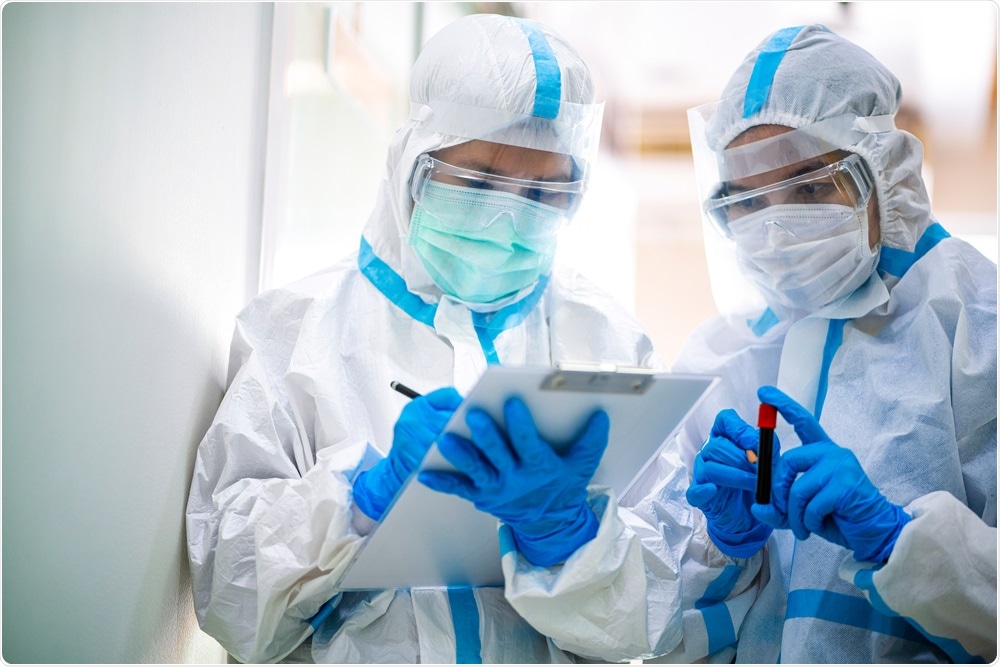Researchers have described the results of a survey aiming to determine the current applicability of the World Health Organization’s COVID-19 Research Roadmap and whether there are new priorities that should be focused on at this point in time during the pandemic.

Study: The remaining unknowns: A determination of the current research priorities for COVID-19 by the global health research community. Image Credit: People Image Studio / Shutterstock
“It is important to assess now, what are the most key remaining questions that need to be addressed, both to ensure this pandemic can be halted and to learn for future outbreaks of this pathogen or another,” writes the team.
The results show that the global research community supports the existing WHO Roadmap, but highlight areas where more focus is needed and where new priorities have emerged.
A pre-print version of the paper is available on the server medRxiv*, while the article undergoes peer review.
The pandemic has evolved at different time points across the globe
The COVID-19 pandemic was declared a global pandemic on 11th March, and the WHO published its Global Research Roadmap the next day.
The aim was to coordinate and expedite the global research response based on the views of 400 experts worldwide.
Three-to-four immediate research priorities were identified across each of nine themes ranging from “Virus natural history, transmission and diagnostics” to “Social sciences in the outbreak response.”
“Now, in June 2020, we see the evolution of this pandemic at different points across the globe,” writes Lang and colleagues.
Given that the pandemic is now being tackled in very different contexts and with more advanced understanding, the researchers aimed to build on the original work of the WHO by obtaining a more current perspective on what the research priorities should be now.
“It is important to assess now, what are the most key remaining questions that need to be addressed, both to ensure this pandemic can be halted and to learn for future outbreaks of this pathogen or another,” they say.
Key questions that were addressed
In a mixed-methods study involving an online survey and workshops, members of the global research community were asked which of the initial WHO roadmap priorities are still the most pressing; whether they are still applicable in different settings, regions, or countries and whether any new priorities have emerged.
Overall, 1,528 individuals completed the survey, and 2,559 attended the workshops, from across 137 countries. The majority were employed in academia, hospitals, research organizations, and non-government organizations.
Analysis of the responses showed that the original WHO Roadmap remained relevant globally, but that certain areas require more emphasis. It also showed that important new priorities have emerged, particularly regarding less-resourced countries where healthcare systems are already poorly equipped.
The study identified that more research is needed to bridge knowledge gaps in certain areas, especially those concerning children, pregnancy, and long-term health impacts of the disease.
A shift in focus from vaccine development to public health intervention
There was a shift in focus from vaccines and therapy development, more towards the effectiveness of public health interventions and measures.
Given that a vaccine may still not be available for at least a year and that no effective antivirals have yet been developed, the only interventions that have been implementable and effective have involved public health measures to curb the spread of the disease.
“It is therefore unsurprising then that the survey respondents and workshop participants ranked highly the need for further studies to evaluate the value of such measures as well as studies on other potential interventions as they arise,” say Lang and colleagues.
New priorities and themes
Various new priorities and themes were identified. For the theme “Virus natural history, transmission and diagnostics,” for example, one new priority was “improved diagnostic tools for safer sample collection, faster and easier assays.”
For the theme “Social sciences in the outbreak response,” a new priority was “understanding COVID-19 in the contexts of conflict, civil war, and refugee situations.”
New themes had also emerged, including “Preparing for the next pandemic,” for which “evaluation of governmental policies and lessons learned” was a priority. Another new theme was “Cross-cutting,” where “the use of technology in various aspects of pandemic response” was flagged as a priority.
The research “achieved its aim”
Lang and colleagues say the study has “achieved its aim” and determined the current global research priorities that now need addressing to help combat the COVID-19 pandemic and prepare for any future outbreaks.
“Taken together, we suggest that these data support the importance of the WHO research roadmap approach and highlights where funders and researcher should be placing emphasis as well as identifying potential new areas that should be tackled within this pandemic,” said the researchers.

 This news article was a review of a preliminary scientific report that had not undergone peer-review at the time of publication. Since its initial publication, the scientific report has now been peer reviewed and accepted for publication in a Scientific Journal. Links to the preliminary and peer-reviewed reports are available in the Sources section at the bottom of this article. View Sources
This news article was a review of a preliminary scientific report that had not undergone peer-review at the time of publication. Since its initial publication, the scientific report has now been peer reviewed and accepted for publication in a Scientific Journal. Links to the preliminary and peer-reviewed reports are available in the Sources section at the bottom of this article. View Sources
Journal references:
- Preliminary scientific report.
Lang T, et al. The remaining unknowns: A determination of the current research priorities for COVID-19 by the global health research community. medRxiv 2020. doi: https://doi.org/10.1101/2020.06.24.20138198
- Peer reviewed and published scientific report.
Norton, Alice, Arancha De La Horra Gozalo, Nicole Feune de Colombi, Moses Alobo, Juliette Mutheu Asego, Zainab Al-Rawni, Emilia Antonio, et al. 2020. “The Remaining Unknowns: A Mixed Methods Study of the Current and Global Health Research Priorities for COVID-19.” BMJ Global Health 5 (7): e003306. https://doi.org/10.1136/bmjgh-2020-003306. https://gh.bmj.com/content/5/7/e003306.